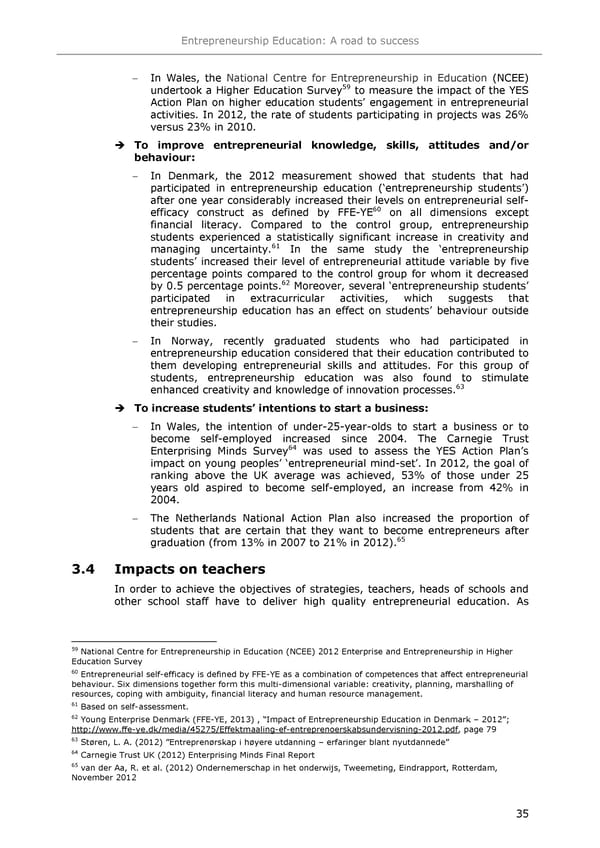Entrepreneurship Education: A road to success In Wales, the National Centre for Entrepreneurship in Education (NCEE) 59 undertook a Higher Education Survey to measure the impact of the YES Action Plan on higher education students9 engagement in entrepreneurial activities. In 2012, the rate of students participating in projects was 26% versus 23% in 2010. To improve entrepreneurial knowledge, skills, attitudes and/or behaviour: In Denmark, the 2012 measurement showed that students that had participated in entrepreneurship education (8entrepreneurship students9) after one year considerably increased their levels on entrepreneurial self- 60 efficacy construct as defined by FFE-YE on all dimensions except financial literacy. Compared to the control group, entrepreneurship students experienced a statistically significant increase in creativity and 61 managing uncertainty. In the same study the 8entrepreneurship students9 increased their level of entrepreneurial attitude variable by five percentage points compared to the control group for whom it decreased 62 by 0.5 percentage points. Moreover, several 8entrepreneurship students9 participated in extracurricular activities, which suggests that entrepreneurship education has an effect on students9 behaviour outside their studies. In Norway, recently graduated students who had participated in entrepreneurship education considered that their education contributed to them developing entrepreneurial skills and attitudes. For this group of students, entrepreneurship education was also found to stimulate 63 enhanced creativity and knowledge of innovation processes. To increase students9 intentions to start a business: In Wales, the intention of under-25-year-olds to start a business or to become self-employed increased since 2004. The Carnegie Trust Enterprising Minds Survey64 was used to assess the YES Action Plan9s impact on young peoples9 8entrepreneurial mind-set9. In 2012, the goal of ranking above the UK average was achieved, 53% of those under 25 years old aspired to become self-employed, an increase from 42% in 2004. The Netherlands National Action Plan also increased the proportion of students that are certain that they want to become entrepreneurs after 65 graduation (from 13% in 2007 to 21% in 2012). 3.4 Impacts on teachers In order to achieve the objectives of strategies, teachers, heads of schools and other school staff have to deliver high quality entrepreneurial education. As 59 National Centre for Entrepreneurship in Education (NCEE) 2012 Enterprise and Entrepreneurship in Higher Education Survey 60 Entrepreneurial self-efficacy is defined by FFE-YE as a combination of competences that affect entrepreneurial behaviour. Six dimensions together form this multi-dimensional variable: creativity, planning, marshalling of resources, coping with ambiguity, financial literacy and human resource management. 61 Based on self-assessment. 62 Young Enterprise Denmark (FFE-YE, 2013) ,
 Entrepreneurship Education Page 38 Page 40
Entrepreneurship Education Page 38 Page 40